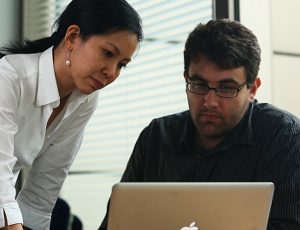Sanger Institute scientist makes Forbes' Top 30 under 30

Wellcome Trust Sanger Institute PhD student Ludmil Alexandrov is one of Forbes’ Top 30 under 30 in the field of science and health. Ludmil has been awarded this recognition for his research to understand the processes that underlie cancer.
Forbes worked with panels of expert judges in each of its 15 categories, ranging from fashion and politics to science and technology, to choose the field’s brightest stars under the age of 30. Forbes describes them as the entrepreneurial, creative and intellectual best of their generation.
Ludmil’s research has been instrumental in redefining how we understand cancer. He and his team have developed mathematical models that identify the fingerprints of DNA-damaging processes that drive cancer development and have deduced the origins of many of these mutational processes. Ludmil’s research could help with the development of new treatments and prevention strategies against a wide range of cancers.
“It’s a great honour to be recognised as one of the 30 rising stars within science and health. My love for problem solving has always driven me to go beyond what has been asked. It is this passion and curiosity that is pushing me to understand many devastating human diseases.
“This achievement would not have been possible without the help and mentorship from my team and colleagues.”
Ludmil Alexandrov PhD student at the Wellcome Trust Sanger Institute
Ludmil’s interest in computers and technology from a very early age led him to enrol in an undergraduate degree in computer science at Neumont University, Utah. Here, Ludmil was awarded with 13 of the IT industry’s most distinguished technology certificates, including ones from Microsoft, IBM and Oracle. He also undertook prestigious internships with the Los Alamos National Laboratory.
During his internships, Ludmil became fascinated by the biological questions and mechanisms that underlie disease. This interest led him to join a lab at Harvard Medical School where he worked on DNA transcription and later to study computational biology at the University of Cambridge.
Ludmil joined the Sanger Institute PhD Programme in 2010 in the Cancer Genome Project under the supervision of Professor Sir Mike Stratton. Since then, he has been enhancing the understanding the mutational processes that take place through one’s life. This research has profound implications for the understanding of cancer development with potential applications in disease prevention and treatment.
“It is Ludmil’s creativity and innovative ability to solve these genomic puzzles that make him a very worthy recipient of this recognition. With the glittering array of talents at his disposal, he certainly has the potential to achieve great things!”
Professor Sir Mike Stratton Director of the Sanger Institute and Ludmil’s supervisor
Ludmil hopes his career in research will build on his current PhD studies, with a specific focus on human ageing and its link with genetic mutations.
“Forbes’ recognition of Ludmil’s research highlights the high calibre of PhD students we have here at the Sanger Institute. We aim to produce the next generation of leaders in genomic research, by exposing our students to cutting-edge technologies and giving them experience in both lab work and informatics. Ludmil is a wonderful example of the well-rounded students we foster, and this award is a recognition of his talent and dedication.”
Dr Julian Rayner Head of the PhD programme at the Sanger Institute
More information
Selected websites
The Wellcome Trust Sanger Institute
The Wellcome Trust Sanger Institute is one of the world’s leading genome centres. Through its ability to conduct research at scale, it is able to engage in bold and long-term exploratory projects that are designed to influence and empower medical science globally. Institute research findings, generated through its own research programmes and through its leading role in international consortia, are being used to develop new diagnostics and treatments for human disease.
The Wellcome Trust
The Wellcome Trust is a global charitable foundation dedicated to achieving extraordinary improvements in human and animal health. We support the brightest minds in biomedical research and the medical humanities. Our breadth of support includes public engagement, education and the application of research to improve health. We are independent of both political and commercial interests.


